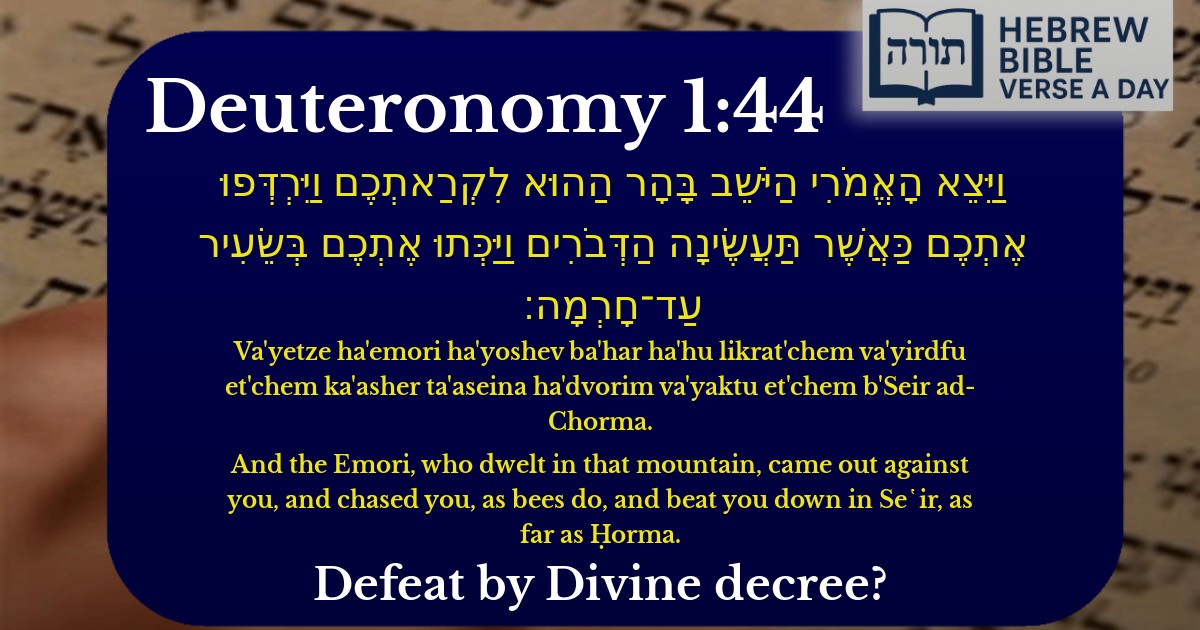Join Our Newsletter To Be Informed When New Videos Are Posted
Join the thousands of fellow Studends who rely on our videos to learn how to read the bible in Hebrew for free!
Hebrew Text
וַיֵּצֵא הָאֱמֹרִי הַיֹּשֵׁב בָּהָר הַהוּא לִקְרַאתְכֶם וַיִּרְדְּפוּ אֶתְכֶם כַּאֲשֶׁר תַּעֲשֶׂינָה הַדְּבֹרִים וַיַּכְּתוּ אֶתְכֶם בְּשֵׂעִיר עַד־חָרְמָה׃
English Translation
And the Emori, who dwelt in that mountain, came out against you, and chased you, as bees do, and beat you down in Se῾ir, as far as Ḥorma.
Transliteration
Va'yetze ha'emori ha'yoshev ba'har ha'hu likrat'chem va'yirdfu et'chem ka'asher ta'aseina ha'dvorim va'yaktu et'chem b'Seir ad-Chorma.
Hebrew Leining Text
וַיֵּצֵ֨א הָאֱמֹרִ֜י הַיֹּשֵׁ֨ב בָּהָ֤ר הַהוּא֙ לִקְרַאתְכֶ֔ם וַיִּרְדְּפ֣וּ אֶתְכֶ֔ם כַּאֲשֶׁ֥ר תַּעֲשֶׂ֖ינָה הַדְּבֹרִ֑ים וַֽיַּכְּת֥וּ אֶתְכֶ֛ם בְּשֵׂעִ֖יר עַד־חׇרְמָֽה׃
וַיֵּצֵ֨א הָאֱמֹרִ֜י הַיֹּשֵׁ֨ב בָּהָ֤ר הַהוּא֙ לִקְרַאתְכֶ֔ם וַיִּרְדְּפ֣וּ אֶתְכֶ֔ם כַּאֲשֶׁ֥ר תַּעֲשֶׂ֖ינָה הַדְּבֹרִ֑ים וַֽיַּכְּת֥וּ אֶתְכֶ֛ם בְּשֵׂעִ֖יר עַד־חׇרְמָֽה׃
🎵 Listen to leining
Parasha Commentary
📚 Talmud Citations
This verse is not quoted in the Talmud.


Context in the Torah
This verse (Devarim 1:44) appears in Moshe's recounting of the Israelites' journey in the wilderness, specifically referencing their failed attempt to enter Eretz Yisrael after the sin of the spies. The Emorim attacked them as they retreated from the land, inflicting a devastating defeat.
Rashi's Explanation
Rashi (Devarim 1:44) explains the comparison to bees in two ways:
Midrashic Interpretation
The Midrash (Devarim Rabbah 1:22) elaborates on the severity of the attack, stating that the Emorim pursued them "until Chorma," which alludes to the concept of cherem (destruction). This emphasizes the totality of their defeat—they were driven back as far as Chorma, a place associated with devastation.
Rambam on Divine Punishment
Rambam (Hilchot Ta'anit 1:1-3) discusses how military defeats like this one serve as a wake-up call for teshuvah. The attack by the Emorim was a consequence of the Israelites' lack of faith after the episode of the spies, demonstrating how abandoning trust in Hashem leads to vulnerability before enemies.
Symbolism of the Emorim
The Kli Yakar (Devarim 1:44) notes that the Emorim dwelling "in that mountain" (ההר ההוא) suggests they were spiritually connected to the mountain's harshness, representing the obstacles that arise when the Jewish people stray from their mission. Their attack was not merely physical but a manifestation of divine retribution for the sin of the spies.
Lessons in Jewish Thought